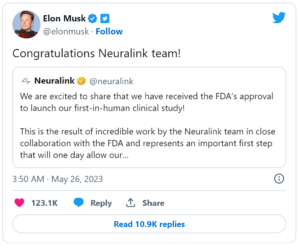Some time ago Elon Musk’s company Neuralink Corp received permission to install a brain implant on a human test subject, and as of today, a queue has formed to receive such a chip.
Musk’s company has so far developed a brain-computer interface (BCI) implanted in the skull by a surgical robot that uses electrodes to process the electrical activity of neurons. The BCI then transmits these signals to another device such as a computer. Neuralink’s early research has focused on motor impairment and spinal cord injuries. This technology allows paralyzed people to move limbs or prostheses and write text messages with just their thoughts.
Musk, who has put at least $100 million of his own money into the venture, however, makes far more fantastical claims about the possibilities of his company’s implant. In addition to claiming that it “allows a paralyzed person to use a smartphone with their mind faster than someone who uses their thumb” and “paraplegics to walk again,” he has speculated that it could eventually cure blindness, schizophrenia, depression, autism, obesity, and insomnia, and one day combines human consciousness with artificial intelligence.
The scientific community is skeptical of Musk’s claims, saying Musk has little or no reason for such optimism. In addition, Neuralink, which has lost several founding members, is plagued by an alleged “blame culture” and unrealistic deadlines set by Musk.
There is a lot of competition in this field at the moment. For example, Blackrock Neurotech, backed by billionaire Peter Thiel, claims to have already implanted their chips in the brains of more than 30 people.
Adam Woodworth, 40, head of security at the Indianapolis museum, suffers from memory loss from a military injury. He has been influenced by the realization that the Neuralink device could be used to treat Alzheimer’s disease and similar brain disorders. “I understand there are risks, but someone has to be willing to step up and take that risk,” he says. “I’m willing to be one of those people if Elon and the Neuralink team let me participate.”
Source: Rolling Stone

